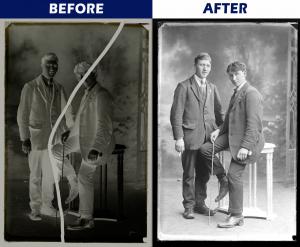Digitisation at PRONI
Digitisation means capturing information in a digital or electronic form. In archives, digitisation means producing a digital copy of a physical record – for example, scanning a paper document into a computerised format. The digital copy is known as a ‘digital surrogate’.

PRONI's specialist Reprographics Unit creates digital copies of archival collections in its care. This helps support the long-term preservation of the original documents (as they are handled less), and makes the records accessible to a greater number of people (by putting them on the web).
By digitising records, PRONI can:
- help people, wherever they are, to access and use a range of collection materials
- engage with new audiences by making PRONI’s collections available online
- build a collection of digital content about Northern Ireland’s documentary and cultural heritage to support research and PRONI’s education, outreach and exhibition activities
- in some cases, improve access to content by enhancing the legibility and clarity of records using digital restoration software techniques
- preserve rare and fragile collections whilst improving access to their content by providing digital surrogates of the items for use
The Digitisation Programme Steering Group selects archival collections for digitisation. The group has representation from all the PRONI business areas, including preservation, customer services and records management, cataloguing and access.
Records undergo a condition assessment before digital capture and any fragile material is treated or stabilised by a conservator, and guidance is given on how it should be handled and supported during the digitisation process.
PRONI uses specialised reprographic equipment to digitise archives, including overhead mounted camera systems, book scanners, microfilm scanners and map scanners.
For each image captured, a high resolution file in TIFF format is stored in the Digital Repository for preservation purposes - see Digital Preservation. Another, smaller copy is also created for delivery via the chosen access system - the standard file format for this is JPEG.
A standard set of metadata is associated with each image file - which includes the corresponding PRONI catalogue reference as well as information such as the image title, description, and date. Images and metadata are quality assured and any corrections, adjustments or re-capture is carried out if required.
PRONI strives to abide by the 'SOAP' (Scan Once for All Purposes) principle which is widely accepted in the field of archival digitisation.
Archival collections which have been digitised by PRONI and are available to the public online include Will Calendars, Valuation Revision Books, Street Directories and Londonderry Corporation Records. See the Search Archives Online section to access these records. PRONI also showcases many of its photographic collections on the website Flickr.
PRONI Reprographics Unit staff are members of the Association for Historical and Fine Art Photography and go to meetings of the Special Interest Group for Archival Imaging.
